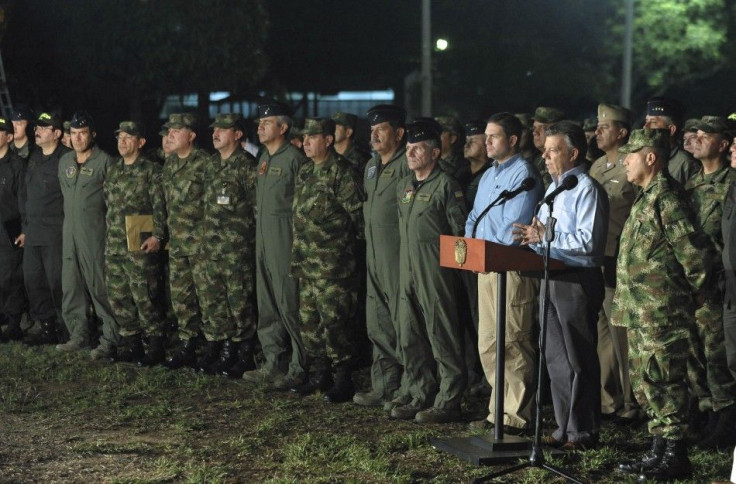Olvídate! : Colombian Government Rejects FARC's Cease-Fire Offer

A few hours after the Colombian left-wing guerilla group, the Revolutionary Armed Forces of Colombia, or FARC told the government they were willing to negotiate a ceasefire after decades of conflict, Colombia President Juan Manuel Santos rejected the proposal.
The government announced on August 27 that they would commence peace negotiations with FARC in October. On Friday, a FARC spokesman, Mauricio Jaramillo, told the AP, "We will propose a cease-fire the moment we sit down at the table. We are going to discuss it."
However, President Santos responded that military operations would continue as planned. Santos has increased military activity and funding since taking office, and said on Friday that, "I have asked military operations be intensified, that there will be no ceasefire of any kind."
The guerilla group has been one of the principal drivers of violence in Colombia since the mid-1960s, and currently controls about one-third of Colombia's territory. FARC has been responsible for most of the kidnappings that have happened within Colombia's borders - such abductions have been motivated by both political and financial considerations.
Statistics on the exact number of people kidnapped are sketchy, but as of July 2005 it was estimated that FARC was responsible for upwards of 2500 civilian kidnappings, besides the high-profile seizures of military or government personnel.
But in February 2012, FARC announced they would no longer be carrying out civilian kidnappings, and that they would release the last ten political prisoners in their custody at the time. President Santos said that he welcomed the move, but there has been no reduction in the Colombian military's activity.
Alfredo Rangel, director of the Security and Democracy Foundation in Colombia, said that the government's rejection of a ceasefire proposal will make FARC look like the good guys.
"The government will reject this immediately and that will play into the hands of the FARC, which wants to continue in combat," Rangel told Reuters in Bogota. "The FARC will use violence to pressure the government at the negotiating table."
FARC Chief Timoleon "Timochenko" Jimenez said in a video statement: "We have never been stronger or more united. They are completely mistaken, those who try to see weakness in our tireless efforts for peace."
The peace talks, which are scheduled to begin in Oslo on October 8 and then move to Havana, are meant to focus on agrarian reform and address issues of poverty in Colombia, among other topicss.
© Copyright IBTimes 2024. All rights reserved.






















